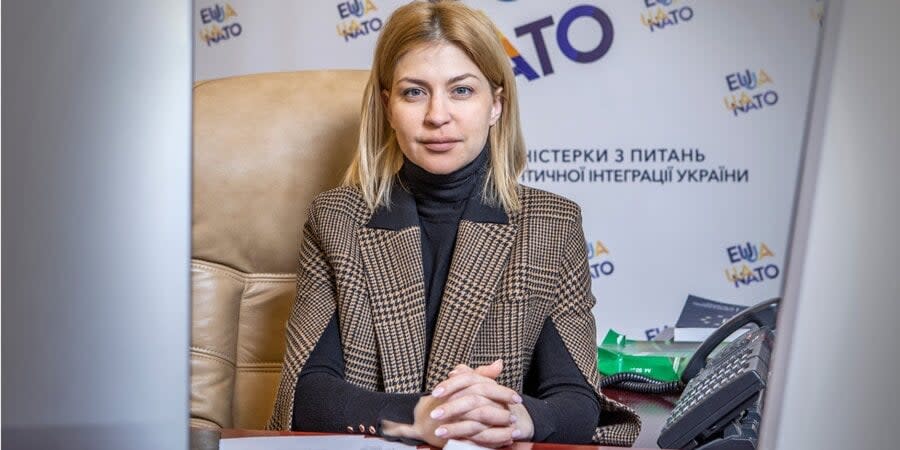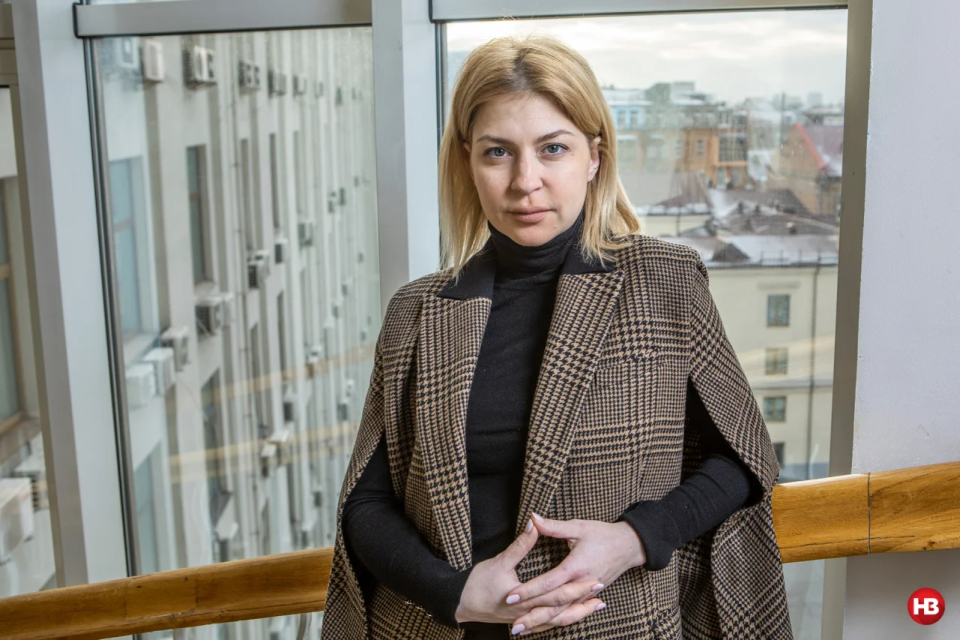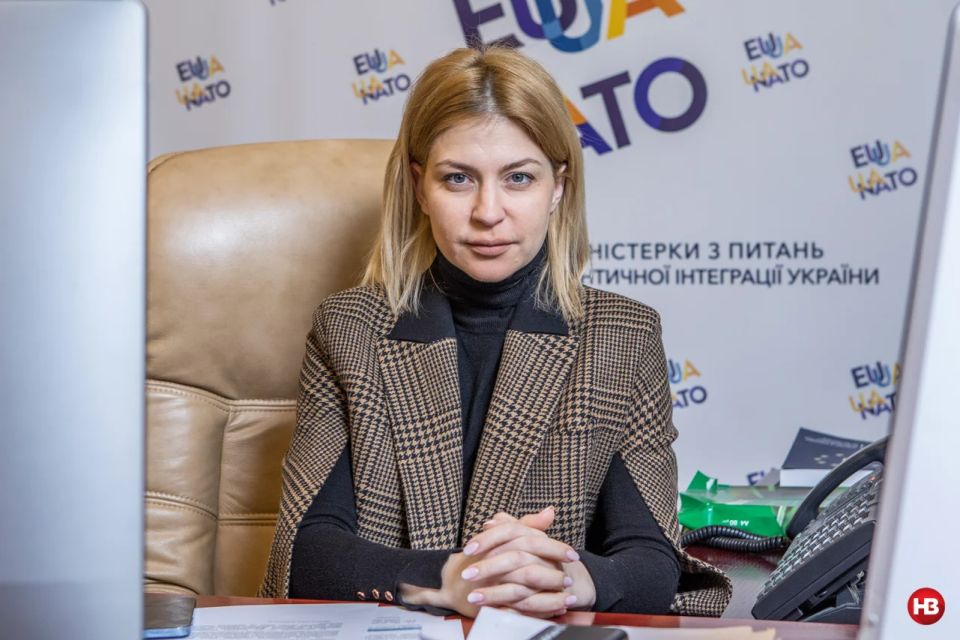How Ukraine keeps migrants connected to home, explains Deputy Prime Minister Olha Stefanishyna – NV interview

In an interview with NV, Stefanishyna spoke about the Ukrainian government’s work on simplifying bureaucratic procedures for temporary migrants in the EU, protecting war-affected Ukrainians, and preparing Ukraine for the post-war recovery.
Read also: Ukraine’s application for NATO membership will reach Brussels soon, says Stefanishyna
NV: How do the EU countries react to the record number of forced migrants from Ukraine today?
Stefanishyna: It is very interesting to separate the numbers of refugees and the real perception of our people by foreigners. In the language of numbers, there are 6.5 million Ukrainian citizens who are currently located on the territory of the European Union as forced migrants. Most of them are women and children. This is probably the largest single movement of people in history since World War II. Let me remind you that a few years ago, when there was a migration crisis in the European Union related to the conflict in Syria, it was about numbers dozens of times smaller.
If we talk about perception, not one of politician in the European Union would dare to call Ukrainians migrants. No one would dare to call Ukrainians a problem. This is probably the most impressive result and I am proud of it. Our citizens became an asset for the EU, because they are extremely qualified and educated. They immediately try to arrange their lives and look for a job after arriving in another country.

Read also: How forced Ukrainian migrants influence EU economy
Fortunately, the European Commission has a service that works with Ukrainian citizens temporarily relocated to the EU. This process is headed by European Commissioner Ylva Johansson. This is the first person I was in contact with in the first hours of the full-scale invasion. We have all seen the traffic jams and how people were leaving Ukraine en masse. It was difficult to imagine what would happen at the border. She was very worried that people would not be released, that documents would be required, besides, at that time, COVID-passports were still relevant for crossing the border. But Ylva Johansson told me: all borders for Ukrainians are open.
As the government, we, in turn, together with the EU, are trying to do everything possible for our people to stay connected with home, to have access to all the necessary services, etc. Approximately once a month, we get together and identify a list of problematic issues that require our maximum attention and the quickest solution.
NV: What is the most pressing question?
Stefanishyna: We manage all issues related to the preparation of documents for children and adults: obtaining passports, driver's licenses, foreign passports, and so on, because citizen documents are expiring and it is necessary to renew them.
Lots of questions were related to the custody of children at the moment of going abroad. After the start of the full-scale invasion, my children first went to the west of Ukraine, and then abroad, together with their grandparents. It is another challenge to prove a family connection to foreign services in such cases. There are countries with very specific laws in this area, such as Italy, so some problems can appear.
NV: Was the decision to send your children out of Ukraine difficult for you?
Stefanishyna: On the eve of the full-scale war, I realized what the situation was. I knew about a certain accumulation of enemy troops. There was a lot of information from different sources, but no one could predict that it would be a full-scale invasion and the movement of Russian columns towards Kyiv.
Read also: 48,000 children born in Ukraine since beginning of Russian invasion, Ukrainian Health Ministry says
I was preparing for the fact that my children and parents could move to the west of Ukraine, that’s why I could fully devote myself to work and not worry about them. They left on February 24, and in fact, that moment was decisive for me, because I made the decision to send my children away, not knowing when I could see them again, or if I could at all. At that moment, I belonged to my country. Almost immediately after the first strikes and the landing of the enemy army in Hostomel, I arrived at work. I understood that I must do everything that depends on me to persevere and to end this war with the victory of Ukraine.
My children returned to Kyiv at the beginning of the school year. It was difficult for them. I had to explain them that I’m returning them to a country where there is a brutal war with the main goal of destroying our nation, and that there is a constant threat of large-scale missile strikes. Despite all these risks, my eldest daughter, who is 11 years old, clearly decided for herself that she does not want to study abroad – she wants to stay in Ukraine.
NV: There are four Rescue Centers opened in Ukraine — services for people who have left the occupied territories or the war zone and need help or support. How are these Centers doing now?
Stefanishyna: Rescue Centers were opened on my initiative, with the assistance of the State Commissioner for Gender Policy and with the support of UNFPA and local authorities. Generally, the clients of these Centers are people who came out through the green corridors and are internally displaced persons. It was important to give them the ability to get all the information they needed in one place.
Read also: Volunteer explains what life under occupation was like in Izyum
The Centers provide free legal and psychological assistance, provide information on obtaining medical services, humanitarian aid, settlement and social benefits. Those who suffered from war crimes committed by the Russian Federation in Ukraine, including sexual and any other types of violence, can also apply for help.
Case managers also work at the Centers - they accompany people who apply to the Centers, if they need such support. Sometimes people need someone to share this journey with them and help them, because these are thousands of stories of people who lived under the occupation, in particular in Mariupol, Zaporizhzhya, and Kyiv Oblast, whose cars were shot while they were leaving the temporarily occupied territories. And a bunch of other terrible things that was hard to imagine before the beginning of the war.
There are plans to scale up the work of the Centers in other cities of Ukraine - another one will open in Chernivtsi soon. At the same time, we are working out the possibilities of opening Centers abroad as well. In addition, depending on the number of Ukrainians abroad, we are discussing the possibility of opening new branches of the state-owned “Document” [firm] abroad, where we could organize the issuance of documents for Ukrainian citizens.
NV: The word "rescued” in the name of the Centers is not an accident, because in the conditions of war, it is very important to choose the right words when it comes to communication with people who have experienced traumatic events.
Stefanishyna: In global practice, the official term “survivors” is used in relation to the civilian population living in the conditions of a military conflict or suffering from the effects of war. So, these people are those who survived the war and were saved. With this name, we wanted to highlight that people are not limited in the issues in which they need help and want to receive it in the Centers. Every person who survived can receive comprehensive care, confidentiality and for free.
NV: In 2022, Ukraine finally ratified the Istanbul Convention — we have been coming to this moment for many years. Representatives of religious communities were regularly spoken "against" [the Convention], as well as defenders of so-called traditional family values. Tell us how the process was going right before the ratification itself, and were there any attempts to disrupt it?
Read also: Rada ticks all boxes needed to start EU membership talks with European Commission, says Stefanchuk
Stefanishyna: It was a difficult path which lasted many years. Before the ratification of the Istanbul Convention, there was no clear consensus on this issue among representatives of civil society. On the other hand, there are things in which any consensus is impossible. A religious community has its own rules, and those rules are respected. But the state cannot be held hostage to the assessment of this or that situation from the religious point of view, especially when it comes to protecting our citizens from domestic violence and preventing it.
For me, there are no complicated laws and difficult decisions. Changes to the legislation on the unacceptability of violence against women and domestic violence, changes to the customs legislation, media law, and the large part of other changes which are related to the rule of law and anti-corruption - looked a little impossible for us. But I understood that there are no difficult decisions, there are decisions which simply take time.
NV: Many people think that it is “not the time” to be making such decisions during war. What would you say to such people?
Stefanishyna: During a conversation with President Volodymyr Zelenskyy, we discussed that today we should start preparing the country for reconstruction after the war. He says that any decisions that could be made right now should be made. We should do it if we have the opportunity. That is why now, while the war is still going on, some difficult laws which have been waiting for decades have been finally passed.
NV: You mentioned the plans for the reconstruction of the country during the war. In a recent conversation with NV, the state commissioner for gender policy, Kateryna Levchenko, noted that the principle of gender equality and inclusion should be among the principles of Ukraine's reconstruction. Why is it important and how should it work?
Stefanishyna: Very often I have to talk to men in politics about what gender equality is and why someone should be connected with it. Very often I am a "darling", "girl", sometimes - Olha Vitalyivna, sometimes - Mrs. Deputy Prime Minister. It’s a long explanation, but I often give just a simple example.
We plan to prepare for consideration in parliament a number of documents related to Ukraine's transition to NATO principles and standards in the security and defense sector. Taking into account direct combat experience since 2014, and after the start of a full-scale war. I coordinate this process as Deputy Prime Minister for European and Euro-Atlantic Integration.
During the first meeting on this issue with senior officials in the security and defense sector, I did not see a single woman there. Next, at a meeting of the commission on Euro-Atlantic integration at the level of heads I see only men there again. This is the level at which politics and tasks are formed exceptionally by men.

But when all the tasks are defined and the politics are organized, I hold the next meeting with the people who should create these documents. I see a lot of women at this meeting. Women continue to do the work "in the field" and this stuff is invisible. Many participants of such meetings simply do not realize it, because these rules are informal but they work for years.
However, this example is precisely about the importance of ensuring gender equality, an inclusive approach to policy-making, decision-making, especially when it comes to rebuilding our country. We have not lived in a closed men's club for a long time, and there are no legal restrictions on the inclusion of women in all processes. But the picture is what it is.
At the beginning of the full-scale war, these issues were slightly removed from the highest level on the state's agenda. But the legal and practical basis that we laid out from the point of view of legislation - equal rights of men and women, combating domestic violence, funding shelters and day cares - all this basis became the framework of our stability at the moment of the start of full-scale enemy aggression.
Read also: Russian assets in Ukraine to fund post-war recovery
Now, when the strategy for the post-war recovery of Ukraine is being developed, we clearly understand that this recovery must take place without discrimination. Nothing about the victims without taking into account the interests of the victims. For this purpose, the government created a panel of experts on gender issues, which includes more than 40 experts. They are working to ensure a gender component in all points of the recovery plan.
NV: How does the war in Ukraine affect on domestic violence statistics?
Stefanishyna: Once in one of the shelters for victims of domestic violence, I met a man who lived in the basement with his common-law wife for ten days. And then he walked 12 km with her, with a bullet in his leg, along the coastline, running away from Mariupol. But when he had got to the shelter, he received psychological help not as a person who suffered from war, but as a person who suffered from domestic violence. This means that family relationships and a common traumatic experience became a bigger trauma for him than evacuation. This is a very clear example.
When we are talking about an increase indomestic violence cases, it is important to mention about people's lack of understanding of how to live on, how to adapt a life during the war and how to interact with those close to them, to ensure that internal problems do not spill over into external problems, and, as a result, into domestic violence. A very important branch in this direction is the National Program of Mental Health and Psychosocial Support, which is coordinated by the Office of First Lady Olena Zelenska and the Ministry of Health. This is one of the key components that should provide our citizens with answers to the questions of how to survive in war conditions, how to support each other in a family. The normalization of the our citizen’s psychological wellbeing is as important as the physical reconstruction of Ukrainian cities. Our people are the greatest treasure.
Read the original article on The New Voice of Ukraine

